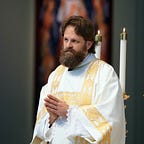Preparing the Soil of Your Heart with St. Francis de Sales
Today is January 24, the Memorial of St. Francis de Sales, bishop and doctor of the Church. It is also Wednesday of the 3rd week in Ordinary Time and the gospel for today’s Mass is Mark 4:1–20, which includes Jesus’ parable of the sower and the seed.
In honor of this saint’s feast day, I’m posting an excerpt from the introduction to my book, The Devout Life: A Modern Guide to Practical Holiness with St. Francis de Sales, in which I reflect on this parable from today’s gospel reading.
St. Francis de Sales often utilized imagery from the world around him to illustrate spiritual truths. In this, he is very much like our Lord, who taught using parables, drawing on familiar images to teach about heavenly realities. One of my favorite parables is that of the sower.
A sower went out to sow. And as he sowed, some seed fell on the path, and birds came and ate it up. Some fell on rocky ground, where it had little soil. It sprang up at once because the soil was not deep, and when the sun rose it was scortched, and it withered for lack of roots. Some seed fell among thorns, and the thorns grew up and choked it. But some seed fell on rich soil, and produced fruit, a hundred or sixty or thirtyfold. Whoever has ears ought to hear (Matt 13:3–9).
The sower in this parable is God, and the seed is God’s grace, the divine life that God wishes to plant in each one of us. That makes us the soil. Notice how in this parable, the sower scatters his seed indiscriminately, but not all of it bears fruit. What makes the difference is the quality of the soil. If the seed falls on rocky ground, it won’t take root. If it falls on parched soil, the plant will wither. If it falls among thorns, it will be choked out.
Practicing devotion to God is all about making our hearts fertile soil in which His seed of grace can be planted, nurtured, and brought to fruition. Although, to the best of my knowledge, St. Francis didn’t intend this, it strikes me that the five sections of his Introduction to the Devout Life correlate perfectly with this parable. Section 1 is all about preparing the soil for planting. If you’ve ever had a garden, you know it can involve hard work. You have to break up the soil to make it soft. You have to pull out any rocks you discover and uproot any weeds you find growing there. Preparing the soil is a laborious task, but it’s necessary to do before you begin. This first section invites us to take a deep look into our hearts, to break up their rocky soil, and to make them ready to receive God’s seed.
Section 2 is about planting that seed through prayer and participation in the sacraments. Section 3 deals with nourishing that seed and helping it to grow by practicing the virtues that will bear good fruit in our lives. But even as your garden grows, it needs tending to — not only by nourishing the good plants you want to grow there but by weeding out the plants that don’t belong. Section 4 addresses how to weed out inevitable temptations before they bear sinful fruit. Finally, every gardener knows you need to renew the soil from time to time to keep it fertile; and so the fifth and final section of this book contains guidance on making an annual “spiritual exam” so that God’s seed may continue to bear in us the good fruit of holiness throughout our lives.
…[T]he purpose of this work is to help readers grow in the daily practice of devotion in such a way as to bring them closer to God through Christ and His Church. It’s about making our souls fertile ground for grace. If my humble words prove even slightly helpful in this regard, it will have been well worth the effort to write this book. My hope is the same as that expressed by St. Francis de Sales himself in the introduction to the third edition of his work: “If God answers my prayers, you will put this little book to good use and receive great blessings from it.”
Below is a link to where you can purchase my book from Sophia Institute Press, as well as a video interview where I discuss the book at length with veteran Catholic podcasters, Greg and Jennifer Willits.
